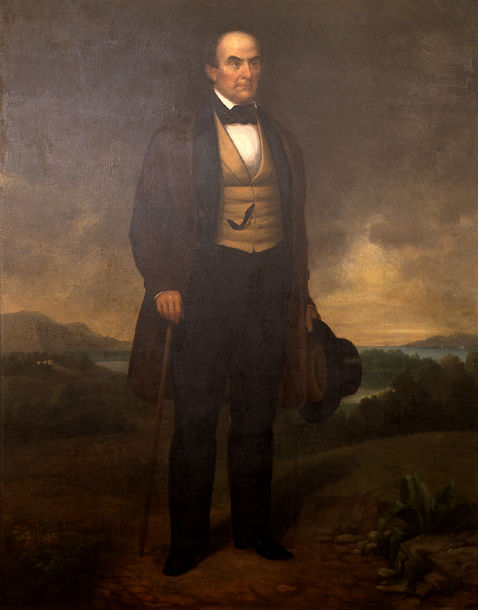
Lately I find myself going farther and farther back in time to discover when there were great men debating the important issues of the day in Washington, DC. The antebellum period between the War of 1812 and the War Between the States is an excellent time to find greatness that is nonexistent today. People remember military men like Ole Hickory, Tippecanoe, and Old Rough and Ready from this period, and they lose a memory of the Bank Wars, states' rights nullification, and Panic of 1837. Of those three military men who became President throughout this period only Ole Hickory had any significant impact on the times.
Another area, other than military actions, to remember great men is in taking arguments before the US Supreme Courts. In my opinion, Daniel Webster was the best. He brought three landmark Supreme Court cases which yielded three rulings favorable to him.
In Dartmouth College v. Woodward, the New Hampshire State Legislature tried to circumvent the original colonial charter that established Dartmouth College back in 1769. Webster was able to guide the court through the difficult political, religious and economic issues and to prove to Chief Justice John Marshall et al, that New Hampshire had violated that section of the U.S. Constitution that states, "no State... shall pass any bill of attainder, ex post facto law, or law impairing the obligation of contracts.
The argument in McCullough v. Maryland covered nine full days. The questions before the Court were: 1) Does Congress have the right to charter a 'National Bank'? and 2) Can a State Legislature tax an institution created by Congress? Daniel Webster spoke for most of the first day of testimony and reminded the Court that,
"an unlimited power to tax involves, necessarily, the power to destroy.After the trial, Chief Justice John Marshall took only three days to hand down one of his longest opinions ever written. Marshall in essence wrote that yes, Congress does have the right to charter a bank and no, an individual State does not have the power to tax and thus 'destroy' an institution created by Congress.
He argued before the US Supreme Court (Gibbons v. Ogden)
The suit was brought about by Thomas Gibbons who started a steamboat line from Elizabethtown, New Jersey into New York City. Gibbons was opposed by powerful interests in New York. Robert Fulton, Robert Livingston and Aaron Ogden shared the monopoly of steamboat traffic in New York waters. Ogden had purchased the right to operate from New Jersey but Gibbons refused to do so. The question before the Court was: Did New York laws granting a monopoly of steamboat traffic violate that section of the U.S. Constitution that leaves to Congress the power to regulate commerce among the several states?
Daniel Webster spoke for two and one-half hours on behalf of his client, Thomas Gibbons. After a short postponement, Justice Marshall returned with the opinion that the acts of New York must yield to the laws of Congress.
These landmark cases show how much he believed in capitalism, liberty, and a strong Union. To him the three are inseparable. I do not hear anyone from either Party today evoke the same passion, and we need it now perhaps more than we did then. As another Diarist has written, not one member of Congress has evoked passion about the House Speaker's accusation that the CIA lied to the US Congress. Not One.
When he was elected to national office he had great oratorical skills, and he cared more in doing what he believed was right than in what he believed was more popular politically. An example is how he positioned on the US Bank. In the winter session of 1814, Daniel Webster headed the opposition against the formation of a national, government-run bank. After the bill was defeated, John C. Calhoun came to Daniel Webster and pleaded for his help in framing a new act that would pass the Congress. Webster agreed and a new bill was drafted but President Madison vetoed the bill as unconstitutional. A year later a third 'bank bill' was drafted with a larger capitalization of $35 million. Webster was opposed to this bill because of the subscription of stock by the government and the appointment of government directors but the bill passed and this time, it was signed by Madison's successor, President Monroe and became law.
Later on when Andrew Jackson was President he supported a bill to renew the charter for the Second Bank of the US. There was a lot of political games being played because the request for a renewal was made four years before it was set to expire. Historians believe it was an attempt at discrediting Andrew Jackson politically. They may be right, and in any event Andrew Jackson showed his shrewd political skills. He vetoed the bill a week after it passed Congress condemning the Bank as unauthorized by the Constitution, subversive to the rights of the States, and dangerous to the liberties of the people.
After the veto, Daniel Webster exclaimed in the Senate,
It manifestly seeks to inflame the poor against the rich. It wantonly attacks whole classes of the people, for the purpose of turning against them the prejudices and the resentments of other classes.In a rebuttal to Jackson's aversion to foreign capital in the B.U.S., Webster again spoke in the Senate,
Every dollar brought from abroad, and put into the mass of active capital at home, ...diminishes the rate of interest and therefore benefits all the active and trading classes of society, at the expense of the American capitalist.
The class warfare game that Jackson played was a brilliant political strategy for him to overwhelmingly defeat his opponent for reelection.
In Jackson's second term the nullification crisis came to a boil and confused the political scene. John C. Calhoun was no longer the Vice-president but was now a Senator from South Carolina. On the floor of the Senate, Webster debated Calhoun on the merits of 'nullification' as troops were being raised in South Carolina. Webster supported Andrew Jackson and the use of force to suppress the rebellion. Henry Clay meanwhile, sided with John C. Calhoun and tried to work out a compromise. Webster came away from the crisis as the great 'Defender of the Constitution.'
The short term political strategy for Jackson was a long term political nightmare for his successor, Martin Van Buren. The Panic of 1837 came under his watch, and it cost him getting reelected in 1840.
The year 1840 is the first time the Whig Party candidate became POTUS. This is also the first time it mattered A LOT to be the VP, because President Harrison died after only about a month into the office. Imagine what kind of alternate world we may be living in today had Daniel Webster been selected as VP? Would the Nation have stabilized its monetary system? Would the War Between the States have started a few years earlier? I don't know.
I believe that the Tea Party protest activities are a sign of a restless mood in a Nation with many people who still believe in liberty, capitalism, and a strong Union. I end by paraphrasing the words in a Simon & Garfunkle cover
Where have you gone Daniel Webster? The Nation turns its lonely eyes towards you.




